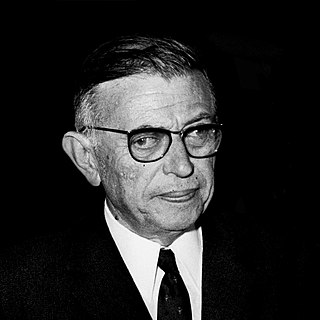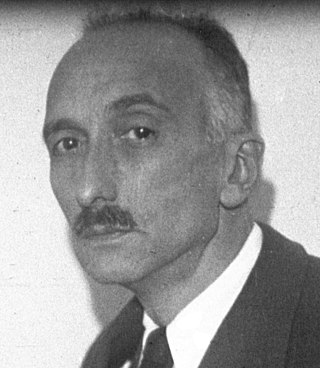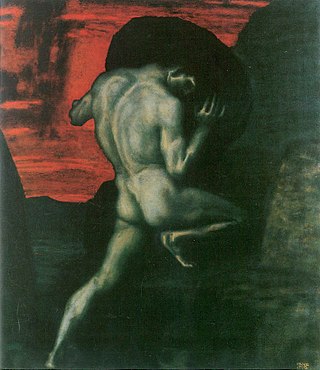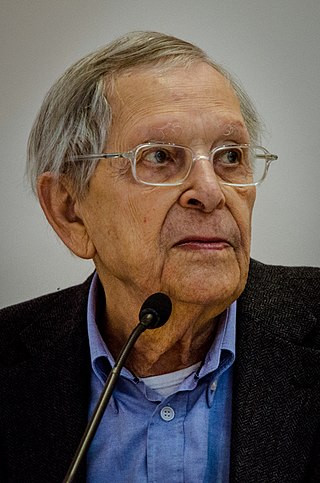
Albert Camus was a French philosopher, author, dramatist, journalist, world federalist, and political activist. He was the recipient of the 1957 Nobel Prize in Literature at the age of 44, the second-youngest recipient in history. His works include The Stranger, The Plague, The Myth of Sisyphus, The Fall and The Rebel.

The Plague is a 1947 absurdist novel by Albert Camus. It tells the story from the point of view of a narrator in the midst of a plague sweeping the French Algerian city of Oran. The narrator remains unknown until the beginning of the last chapter. The novel presents a snapshot into life in Oran as seen through the author's distinctive absurdist point of view.

Existentialism is a family of philosophical views and inquiry that prioritize the existence of the human individual, study existence from the individual's perspective, and conclude that, despite the absurdity or incomprehensibility of the universe, individuals must still embrace responsibility for their actions and strive to lead authentic lives. In examining meaning, purpose, and value, existentialist thought often includes concepts such as existential crises, angst, courage, and freedom.

Jean-Paul Charles Aymard Sartre was a French philosopher, playwright, novelist, screenwriter, political activist, biographer, and literary critic, considered a leading figure in 20th-century French philosophy and Marxism. Sartre was one of the key figures in the philosophy of existentialism. His work has influenced sociology, critical theory, post-colonial theory, and literary studies. He was awarded the 1964 Nobel Prize in Literature despite attempting to refuse it, saying that he always declined official honors and that "a writer should not allow himself to be turned into an institution."

The Myth of Sisyphus is a 1942 philosophical essay by Albert Camus. Influenced by philosophers such as Søren Kierkegaard, Arthur Schopenhauer, and Friedrich Nietzsche, Camus introduces his philosophy of the absurd. The absurd lies in the juxtaposition between the fundamental human need to attribute meaning to life and the "unreasonable silence" of the universe in response. Camus claims that the realization of the absurd does not justify suicide, and instead requires "revolt". He then outlines several approaches to the absurd life. In the final chapter, Camus compares the absurdity of man's life with the situation of Sisyphus, a figure of Greek mythology who was condemned to repeat forever the same meaningless task of pushing a boulder up a mountain, only to see it roll down again just as it nears the top. The essay concludes, "The struggle itself towards the heights is enough to fill a man's heart. One must imagine Sisyphus happy."

The Stranger, also published in English as The Outsider, is a 1942 novella written by French author Albert Camus. The first of Camus's novels published in his lifetime, the story follows Meursault, an indifferent settler in French Algeria, who, weeks after his mother's funeral, kills an unnamed Arab man in Algiers. The story is divided into two parts, presenting Meursault's first-person narrative before and after the killing.

Absurdist fiction is a genre of novels, plays, poems, films, or other media that focuses on the experiences of characters in situations where they cannot find any inherent purpose in life, most often represented by ultimately meaningless actions and events that call into question the certainty of existential concepts such as truth or value. In some cases, it may overlap with literary nonsense.

François Charles Mauriac was a French novelist, dramatist, critic, poet, and journalist, a member of the Académie française, and laureate of the Nobel Prize in Literature (1952). He was awarded the Grand Cross of the Légion d'honneur in 1958.

Absurdism is the philosophical theory that the universe is irrational and meaningless. It states that trying to find meaning leads people into conflict with a seemingly meaningless world. This conflict can be between rational man and an irrational universe, between intention and outcome, or between subjective assessment and objective worth, but the precise definition of the term is disputed. Absurdism claims that, due to one or more of these conflicts, existence as a whole is absurd. It differs in this regard from the less global thesis that some particular situations, persons, or phases in life are absurd.
Ni Putes Ni Soumises is a French feminist movement, founded in 2002, which has secured the recognition of the French press and the National Assembly of France. It is generally dependent on public funding. It is also the name of a book written by Fadela Amara, one of the leaders of the movement, with the help of Le Monde journalist Sylvia Zappi.

Combat was a large movement in the French Resistance created in the non-occupied zone of France during the World War II (1939–1945).

Paris-soir was a French newspaper founded in 1923 and published until 1944 when it was banned for having been a collaborationist newspaper during the war.

Combat was a French newspaper created during the Second World War. It was founded in 1941 as a clandestine newspaper of the French Resistance.
Pascal Pia, born Pierre Durand, was a French writer, journalist, illustrator and scholar. He also used the pseudonyms Pascal Rose, Pascal Fely and others.

The Misunderstanding, sometimes published as Cross Purpose, is a play written in 1943 in occupied France by Albert Camus. It focuses on Camus’ idea of The Absurd.
Francine Faure was a French pianist specializing in Bach. She was also a mathematician. She was the second wife of Albert Camus, whom she met in 1937 in Algiers. They were married in Lyon on 3 December 1940. She came from a middle-class French family in Oran, Algeria, which was a French colony at the time. She also taught mathematics, sometimes as a substitute teacher.
Atheistic existentialism is a kind of existentialism which strongly diverged from the Christian existential works of Søren Kierkegaard and developed within the context of an atheistic world view. The philosophies of Søren Kierkegaard and Friedrich Nietzsche provided existentialism's theoretical foundation in the 19th century, although their differing views on religion proved essential to the development of alternate types of existentialism. Atheistic existentialism was formally recognized after the 1943 publication of Being and Nothingness by Jean-Paul Sartre and Sartre later explicitly alluded to it in Existentialism is a Humanism in 1946.

Roger Grenier was a French writer, journalist and radio animator. He was Regent of the Collège de ’Pataphysique.
Jean-Paul de Dadelsen was a French schoolmaster, officer, journalist, broadcaster and poet. He was an early supporter of a European Common Market and adviser to Jean Monnet.
Justin O'Brien was an American biographer, translator of André Gide and Albert Camus and professor of French at Columbia University.














